Quarantine Weight Gain: 35.82% Gained Weight During Pandemic [19,903 Person Study]
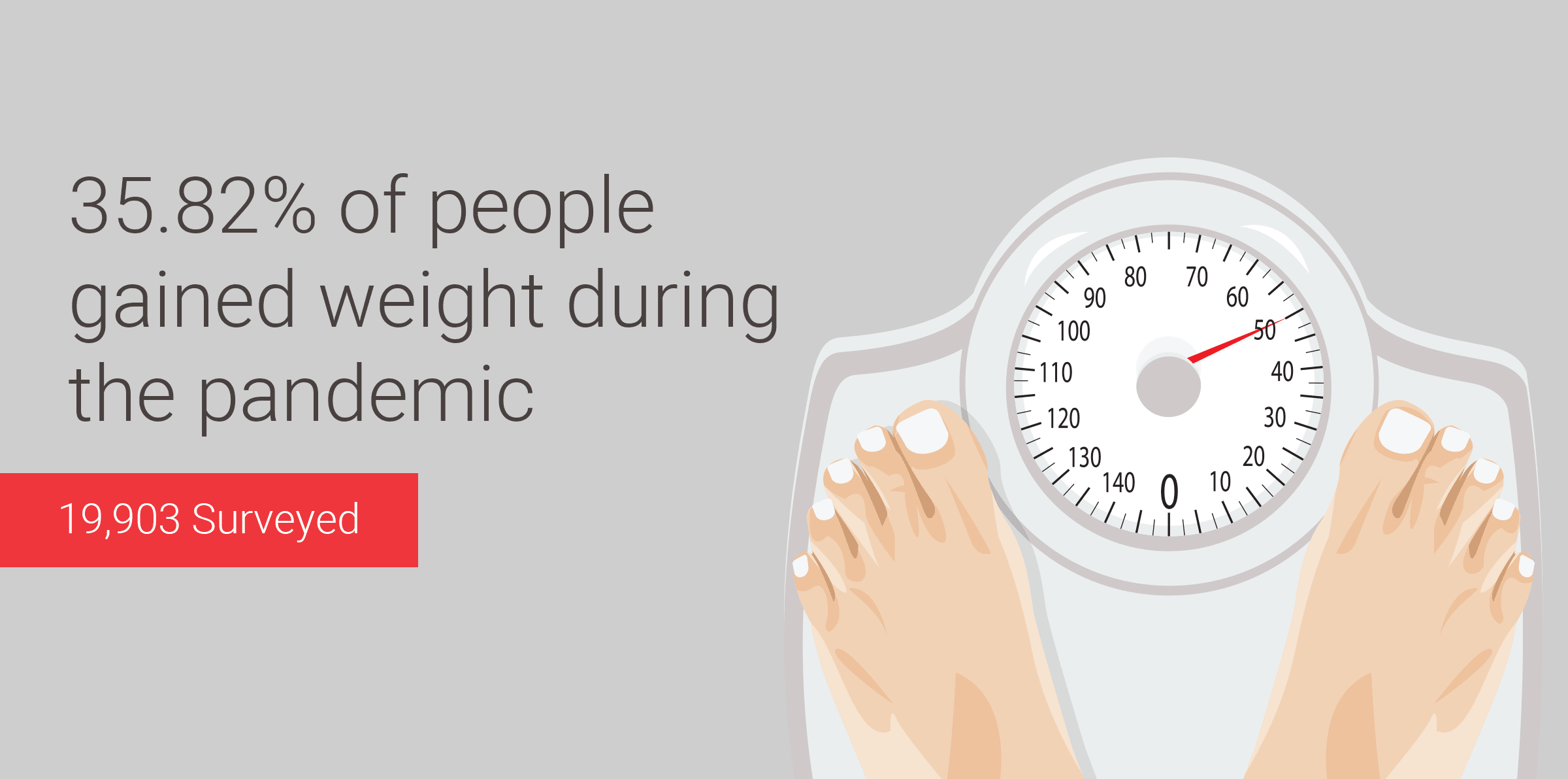
In previous research, we found that the lockdown led to people exercising more than they were prior to the pandemic - staying active to enjoy the health benefits of exericse. Additionally, we have found that nearly 70% of gym members haven’t gone back to their gyms, nor do they plan to anytime soon.
All along, conversations regarding the “Quarantine 15” and weight gain during the pandemic have been ongoing. In order to learn just how this pandemic has impacted people’s weight around the world, we surveyed 19,903 people from 140 countries.
Key Findings
- Globally, 35.82% of people reported they gained weight during the pandemic
- Of those that gained weight, 71.25% gained more than 5lbs.
- The United States had the highest percentage of people gain weight (40.52%) during the pandemic
- The UK had the most respondents managing to lose weight (40.54%) during this pandemic, while the US had the least (27.71%).
- In comparison to men, women were 14.17% more likely to gain weight and 16.82% less likely to lose weight.
If interested in interviews or additional findings, please reach out to Nick Rizzo at nick@runrepeat.com, otherwise, feel free to use these findings freely, we just ask that you reference this study with a link back to this post. Additionally, be sure to check out our new fitness trends report that breaks down how achieving fitness goals have changed going into 2021.
Quarantine weight gain: how many people gained weight during the pandemic?
Of the 19,903 people surveyed, 35.82% reported that they had gained weight during the pandemic.
71.25% of those that reported gaining weight had gained 5 or more pounds.
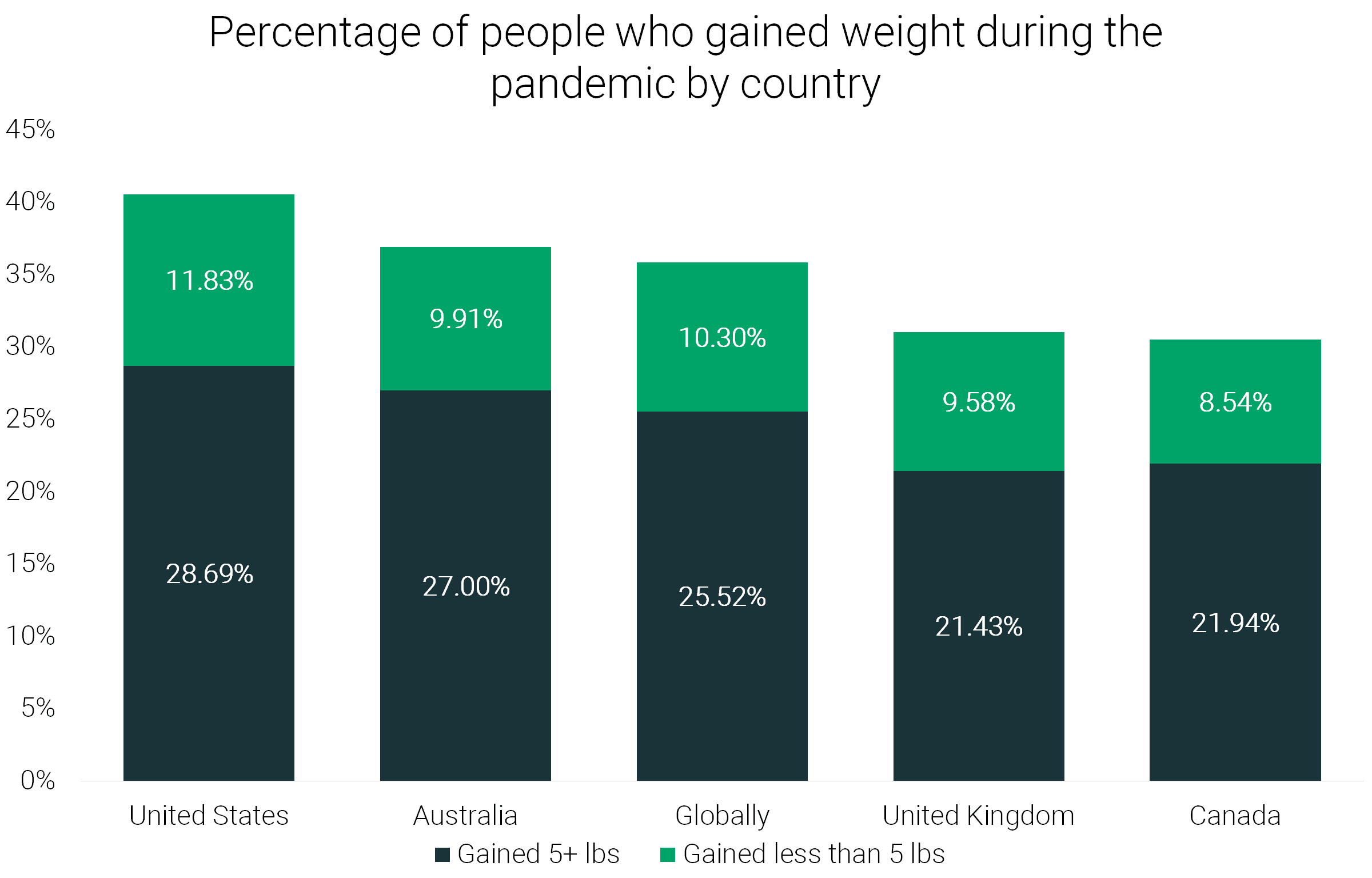
The United States had the largest percentage of respondents report gaining weight overall (40.52%) as well as the most who gained over 5lbs (28.69%).
The UK and Canada fared best, with only 31.01% and 30.48% of respondents saying they gained weight respectively.
How many people avoided weight gain during the pandemic?
40.54% of respondents from the UK reported losing weight, the most of any country.
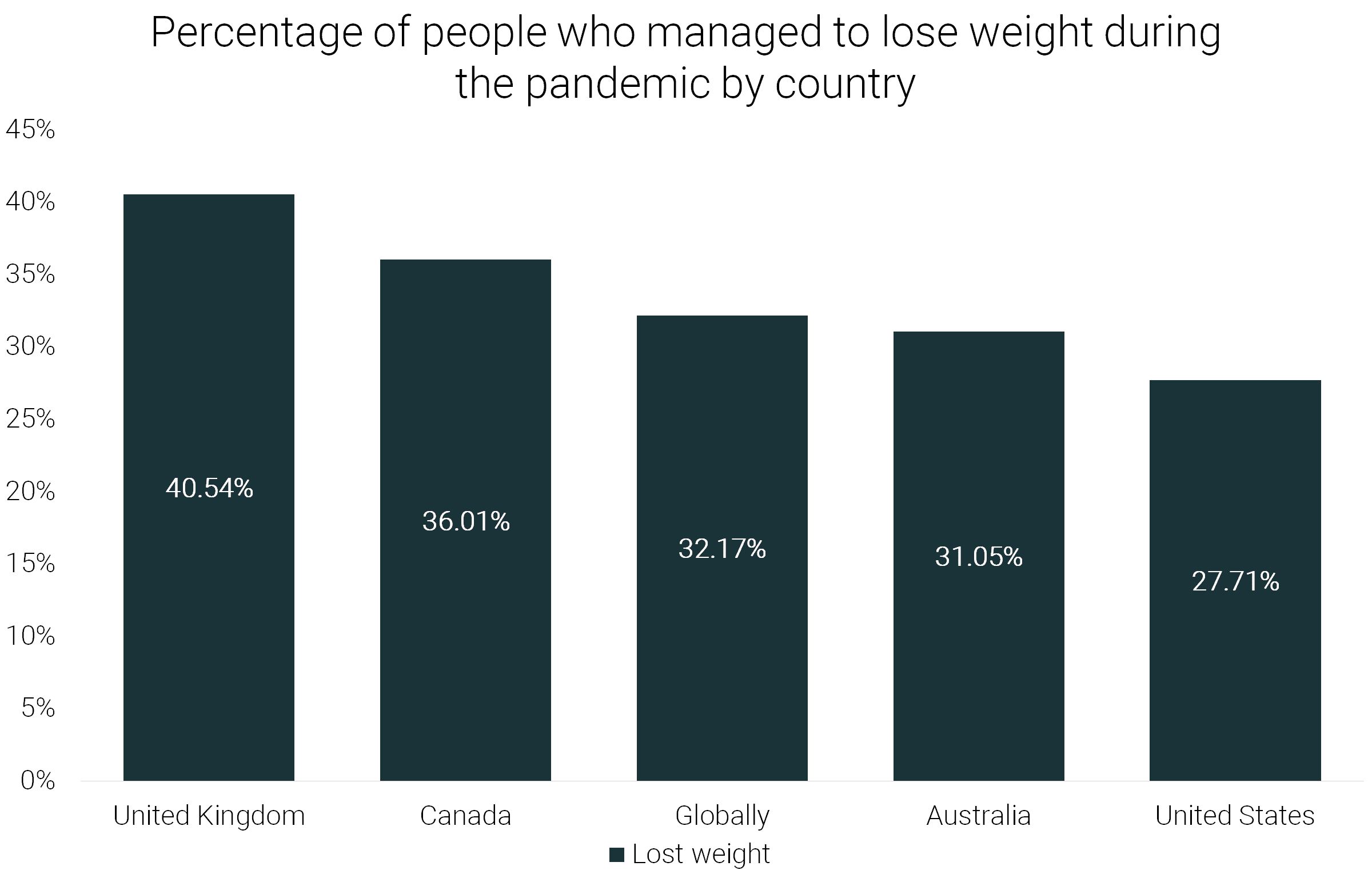
The UK and Canada are also the only countries that had more respondents report having lost weight than having gained.
While the United States had the lowest amount of reported weight loss, with only 27.71% managing to lose weight during the pandemic.
Differences in weight gain during quarantine by gender
Globally, women were 14.17% more likely to gain weight than men during the pandemic.
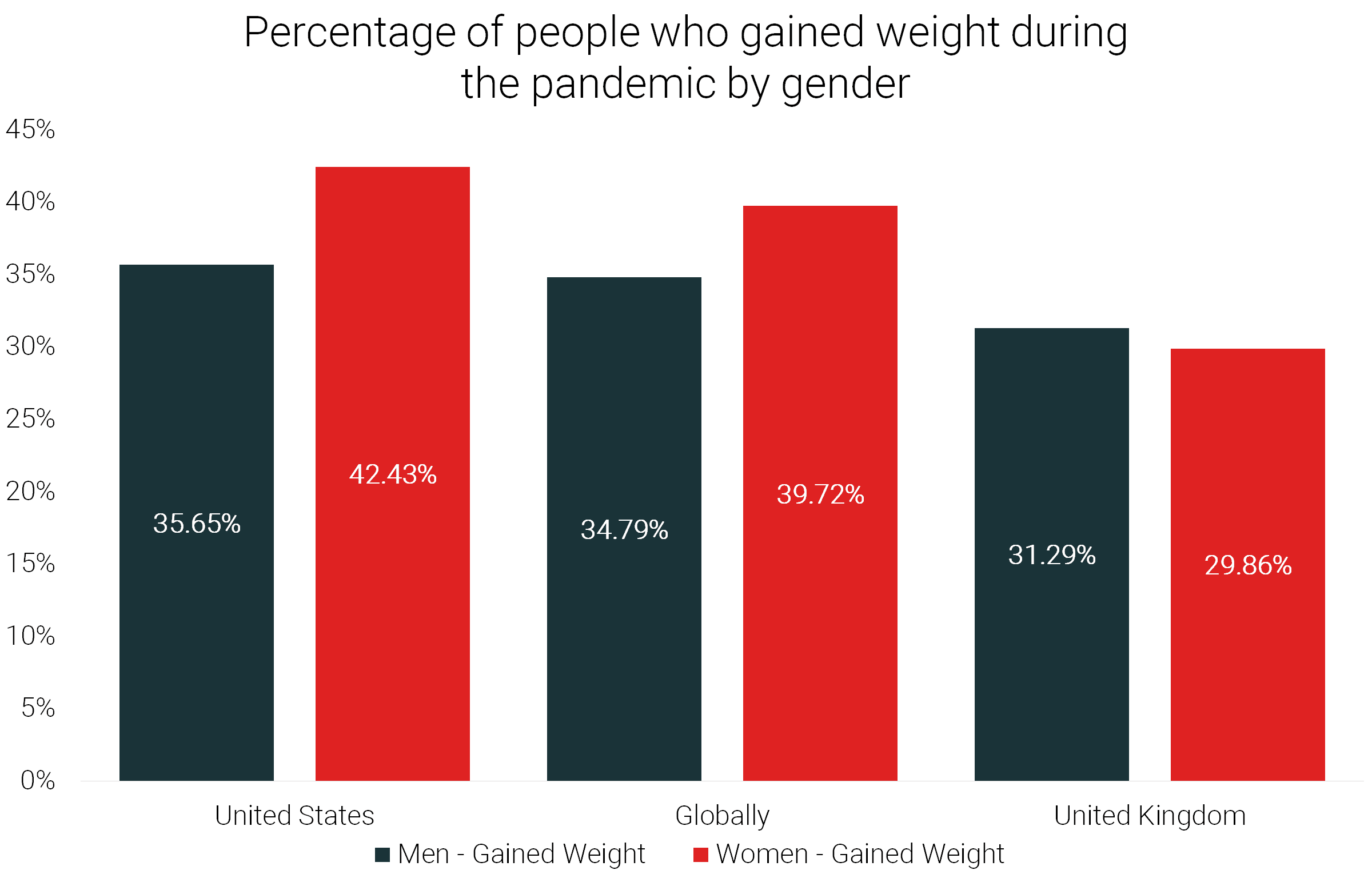
This difference between men and women was the most dramatic in the United States; women from the US were 19.02% more likely to gain weight than men.
Differences in avoiding gaining weight during COVID-19 pandemic by gender
Fewer women reported losing weight than men as well. Overall, women were 16.82% less likely to lose weight than men.
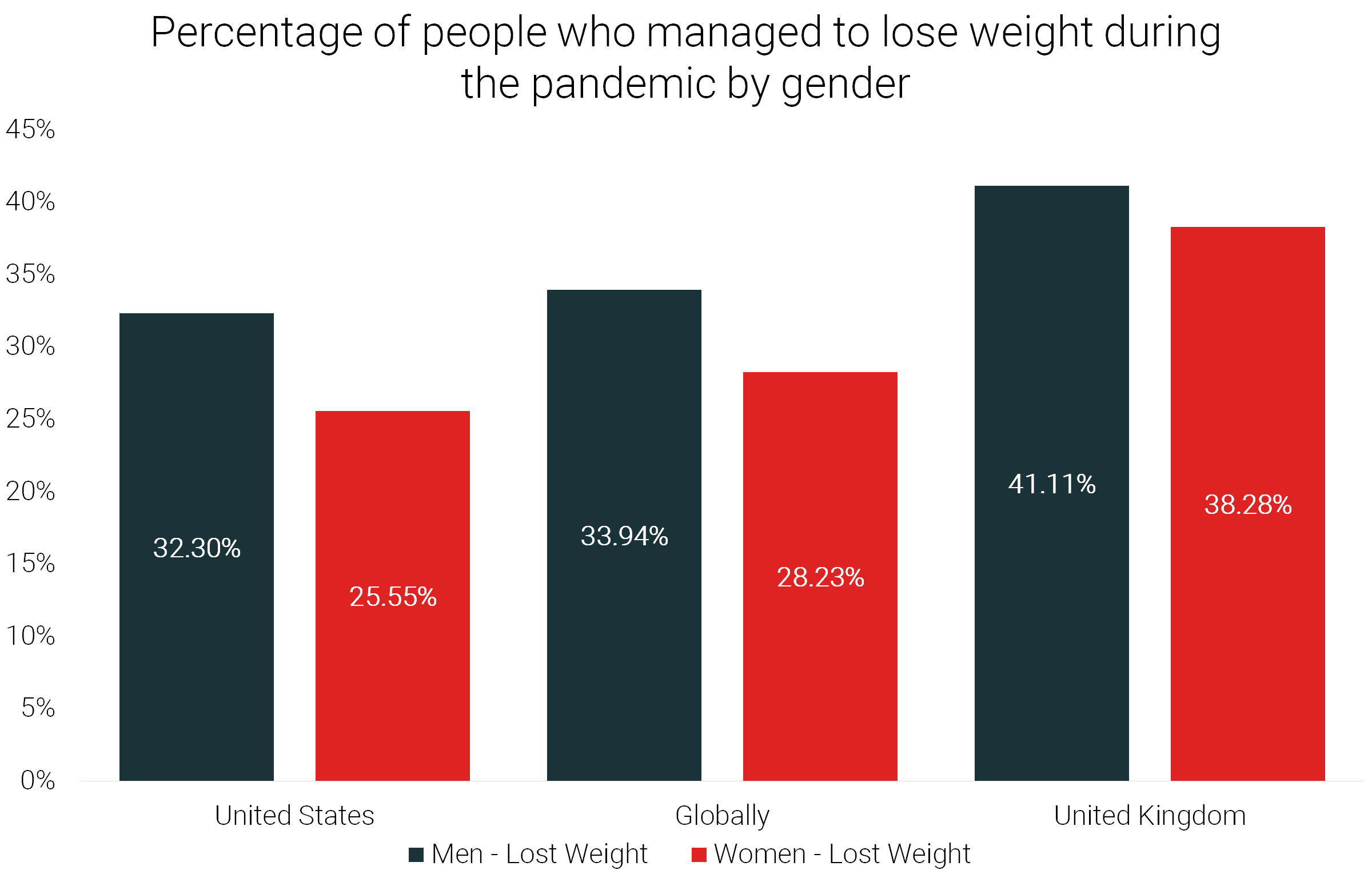
The difference between men and women is the largest in the US, with women being 20.89% less likely to have lost weight in comparison to men.
How many people experienced quarantine weight gain by state
The differences in weight gain by state ranged from as low as 29.95% to as high as 41.57%.
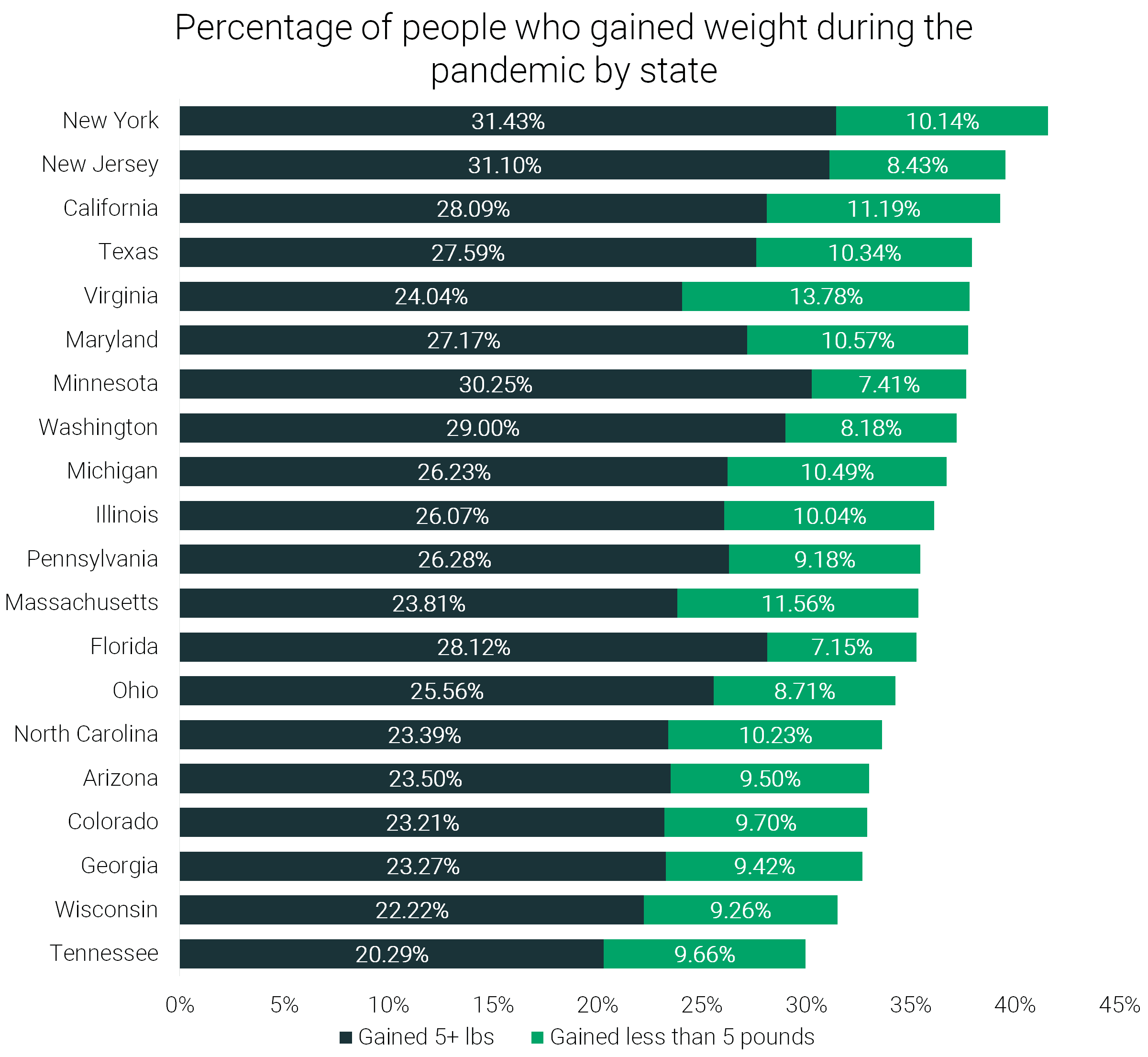
New York was both the state that had the most people report gaining weight overall (41.57%) as well as the state with the highest percentage of people reporting they gained more than 5 lbs (31.43%).
On the opposite end of the spectrum, Tennessee had the least people report gaining weight during the pandemic (29.95%) and the least amount of people reporting gaining more than 5lbs (20.29%).
How many people reported avoiding quarantine weight gain by state
The difference in the percentage of people reporting they lost weight by state ranged from as low as 28.00% to as high as 35.67%.
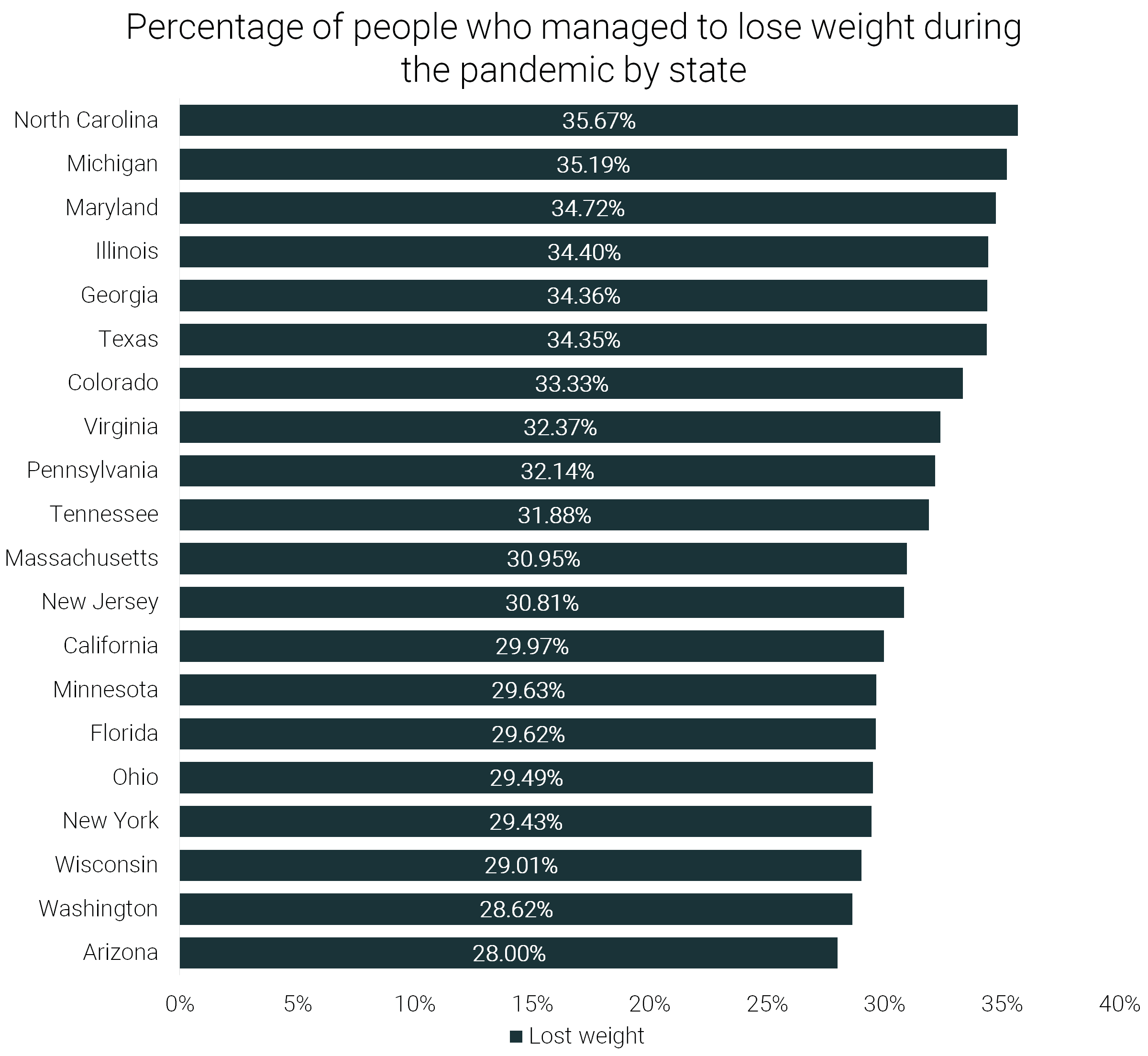
North Carolina had the most people manage to lose weight during the pandemic (35.67%) while Arizona had the least (28.00%).
Conclusion
Those that experienced the most weight gain during the pandemic are females, from the United States, and more specifically, New York, New Jersey, California and Texas.
In comparison, those that experienced the most weight loss were males, from the United Kingdom, and from the states North Carolina, Michigan, Maryland, and Illinois.
Quarantine weight gain FAQ and statistics
What is the '"Quarantine 15"?
The "quarantine 15" is the new "freshman 15"; It is referring to the excess weight gain that people experience during long bouts of isolation, stress, and reduced physical activity.
Why are people gaining weight during the pandemic?
When the lockdowns started due to the COVID 19 pandemic, each person felt the effects of having their daily routine and healthy habits disrupted. Many people's exercise routine was upended, especially those who play sports or relied on the gym. With activity levels low and living a more sedentary lifestyle, it makes sense that people are struggling with weight.
Also, stress levels are at an all-time high due to the pandemic itself, as well as having fewer outlets to reduce our stress. On top of being a general mental health concern, these stress levels can spark emotional eating. This can push us towards eating less healthy foods, whether it's comfort food, ultra-processed foods, or junk food.
Quarantine weight gain and quarantine weight loss statistics
Here are additional studies, stats, and findings regarding quarantine weight gain and weight loss that we came across during our additional research:
- According to an anonymous study conducted by Withings, maker of internet-connected weighing scales, only 37% of Americans gained more than one pound by the time the initial Covid-19 lockdowns ended. On average, Americans only gained 0.21 pounds, which is a lot less compared to the average weight gain in the UK (0.35 lbs), Germany (0.41 lbs), China (0.55 lbs), Italy (0.42 lbs), and Spain (0.26 lbs). [2020]
- The French tech company, Withings, determined that more people became active in the United States, except for the state of New York which saw its activity drop by 22% because of Covid-19 pandemic restrictions. On average, a person's daily steps in Indiana increased by 16%, 11% in Connecticut, 9% in West Virginia, Ohio and Michigan both saw daily steps increase by 6%, and Louisiana experienced a 4% increase in daily steps. [2020]
- The Withings survey also discovered that globally, people have increased their physical activity. Some of the activities used to improve people's health include yoga (42%), hiking (34%), indoor cycling (19%), running (18%). However, physical activities that use special equipment saw a significant decrease. Indoor tennis decreased by 66%, swimming by 53%, badminton 50%, and running indoors 39%. [2020]
- According to a poll conducted by WebMD among their US readers, 47% of women and 22% of men gained weight, and they're blaming Covid-19 pandemic restrictions for this. Meanwhile, when their international readers were polled, they deemed that 55% of men gained weight while only 34% of women did. [2020]
- A person's mental health affects their overall well-being. The WebMD poll discovered that 70% of persons who gained weight were due to stress eating caused by concerns regarding their jobs, homes, and future in general. Meanwhile, 21% stated that drinking extra alcohol caused them to pack more pounds. [2020]
- An article from Lose It! determined that since the start of the quarantine, people have increased their sugar intake by 53%. Some of the most common calorie-loaded foods added to their diet include candies, which is up by 266%. The most popular choices are Lindt Dark Chocolate (74%), Reeses (54%), M&Ms (47%), and Twizzlers (13%). [2020]
- In some cases, people added nutrient-packed sweets to their diet. Some of the top choices were blueberries (57%), apple (39%), grapes (27%), and oranges (20%). [2020]
- According to a public health survey, 36% of people who were highly active before the pandemic spent more time exercising during the lockdown. Also, 54% of the highly active people claimed to have more time to exercise. However, these highly active people also reported spending more time sitting (46%) than before. [2020]
- Some of the obstacles faced when it came to decreased physical activities include the closure of sports clubs (38%), cancelled sports events (32%), and lack of people to exercise with (30%). [2020]
